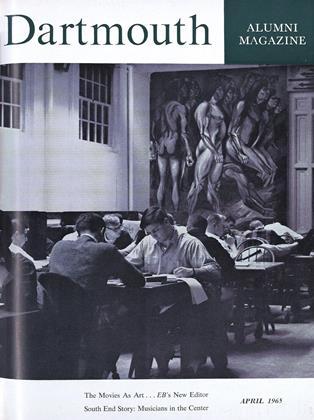By James S. LeSure '35. New York: Harper & Row Publishers, 1965. 172 pp. $3.95.
The militant march of scholars along the frontiers of knowledge has always been accompanied by a bombardment of terminol- ogy. As new beachheads of learning are established, the demand for specialization increases and with it come inevitable semantic skirmishes placing temporary stress on the overall communications system so necessary for interdisciplinary cooperation and understanding.
The educational battlefront is no exception. Research and experimentation in the areas of guidance, measurement, curriculum, and educational psychology have resulted in countless pages of new jargon and redefining of traditional lingo. As interested citizens attempt to guide and participate in the development of education, their minds are harassed by the static of meaningless or indefinite terms.
James S. LeSure, an experienced educator in Connecticut, attempts to clear the air and, at the same time, lodge a few constructive protests. The several hundred definitions Mr. LeSure presents are an entertaining and useful combination of humor, candor, and accurate information. To illustrate: for the term disadvantaged, he begins by saying, "Take comfort, Madison Avenue. You do not labor alone in your crusade to corrupt the language! This is a new example of education's (or was it sociology's) contribution to the cause." Remaining true to his purpose as a lexicographer, he finishes by saying, at the end of his definition, "Let it be said in all fairness that the term has crept into pedaguese as a result of growing concern among its users that the schools are not doing all they should for the 'disadvantaged'."
The terms Mr. LeSure includes range from those which are abbreviations, such as I.Q., to those one might encounter at a PTA open house, such as grading or book fair; and from those usually uttered in a parentcounselor conference, such as median or heterogeneous, to those seen in the education sections of newspapers, such as community survey, authoritarian, or programmedlearning.
Because of his anecdotes, his sarcasm, his genuine concern and his ability to express himself, Mr. LeSure's book reads like a tasty bit of journalism rather than a handbook of terms.
He is to be commended for a contribution to education that is worthwhile reading for parents and educators who possess a sense of humor, a sense of obligation, and a sense of perspective.
Before joining the College's AdmissionsOffice, Reviewer Jaeger taught English atHanover High School.
 View Full Issue
View Full Issue
More From This Issue
-
 Feature
FeatureThe Movies As Art
April 1965 By DAVID STEWART HULL '60 -
 Feature
FeatureEB's EDITOR
April 1965 By CLIFFORD L. JORDAN '45 -
 Feature
FeatureAmbassadors Without Portfolio
April 1965 By PAUL C. PRINGLE '65 -
 Feature
FeatureSOUTH END STORY
April 1965 -
 Article
ArticleWITH THE BIG GREEN TEAMS
April 1965 By ERNIE ROBERTS -
 Article
ArticleLove-Letter to a College
April 1965 By A NEW ASSISTANT PROFESSOR
RICHARD G. JAEGER '59
Books
-
 Books
BooksTen Introductions a Collection
January 1935 -
 Books
BooksFaculty Notes
October 1948 -
 Books
BooksPROBLEMS OF AMERICAN DEMOCRACY
January 1941 By Everett W. Goodhue '00 -
 Books
BooksSHORT CUT TO TOKYO,
October 1943 By Herbert F. West '22 -
 Books
BooksTHE CASE AGAINST NATURAL CHILD BIRTH.
JULY 1965 By JOHN S. LYLE '34, M.D. -
 Books
BooksREADINGS IN THE FAMILY
March 1935 By R. P. Holben


